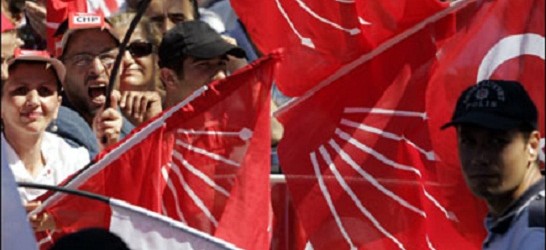After three consecutive defeats against ruling Justice and Development Party in 2002, 2007 and 2011, Turkey’s first political party Republican People’s Party is having difficult days while fluctuating between Kemalism and social democracy.
Republican People’s Party was established in 1923 by modern Turkey’s founder and charismatic leader of Turkish Independence War (1919-1922) Mustafa Kemal Atatürk as a political body which would implement country’s modernization reforms not only in politics and economics, but also in terms of culture and law. RPP’s reforms aiming to create a pro-Western and secular state from a pious and uneducated Muslim society became mostly successful in terms of rising the legitimacy of the Republic instead of Sultanate and Caliphate based monarchy, but three important problems could not be solved by the single-party government; civil-military relations, the Kurdish question and secularism-Islamism debates. After transition to multi-party democracy, RPP tried to position itself as a center-left social democratic party but did not give up from its modernistic characteristics coming from Kemalism. The party also could not be successful in coming to power and solving these three main problems that Turkey has been facing with.
Problematic nature of civil-military relations in Turkey and the guardianship role of Turkish Armed Forces led to two grand coups (27 May 1960 and 12 September 1980), a memorandum (12 March 1971) and many extraordinary events such as 28 February 1997 process in Turkish political history. Civil-military relations seem to get normalized in recent years although there are fears of rovanchism and revenge due to harsh legal practices over Turkish generals and soldiers who are accused of implementing or engineering a coup against the civilian governments. Kurdish question on the other hand was broke out violently after the 12 September 1980 coup and PKK terrorism caused the death of more than 30.000 Turkish citizens. Kurdish question still seems unsolved although the Turkish state made many important legal and cultural reforms and openings in this field especially in the last decade. The third problem Islamism-secularism debates still constitutes the main fault line in Turkish politics and it has always been a very fertile ground for populist Islamist leaders throughtout the Republican history. Republican People’s Party’s most important weakness seems to be this problem since the party is often wrongfully considered as a political establishment aiming to spread out atheism by pious segments of the society.
Although Republican People’s Party’s main ideological source is always Kemalism, the modernization paradigm of Turkish Republic, the party showed some successes in its history in reforming its ideology and renewing itself. In the late 1950s, the party renewed itself with modern liberal ideas and projects and became the primary actor in the preparation of the progressive 1961 constitution. In the 1970s, the party successfully transformed itself into a social democratic populist party under the charismatic leadership of Bülent Ecevit. The party developed many concrete projects and policy suggestions although these efforts never turned into accomplishments due to violent nature of Turkish politics in the 1970s and RPP’s eternal problem of coming to power. During 1980s and 1990s, RPP gave up from its socialist-leaning economic obsessions of the 1970s and became a social democratic-liberal party mainly focusing on the protection of secular and democratic nature of the Republic and Turkey’s integration with the Western world. However, the party’s problem in reaching out the conservative segments as well as Kurds continued and RPP’s voting spectrum changed between % 15-25 of Turkish society, mostly consisted of better educated middle-class people attaching themselves to Kemalism more than social democracy.
Republican People’s Party in recent years is again on the verge of an ideological change but the party base and organization do not seem very willingly to give up from Kemalism due to rising fears of authoritarian Islamism under JDP rule. Moreover, unlike 1970s the party leadership does not seem charismatic enough to convince its voters and members for an ideological revision. Thus, RPP hesitates between Kemalism and social democracy and is often perceived by Turkish people as a party struggling in its own problems instead of giving hope. The party obviously is in need of a synthesis of Kemalism and social democracy and a strong leadership that could manage this process. This could be done only if the party could open its doors to young and unstained educated people coming from the society and abolish its elitist but at the same time strangely middle-class image by coming into contact with all segments of the society including business circles, workers syndicates, religious groups etc.
Dr. Ozan ÖRMECİ

























































